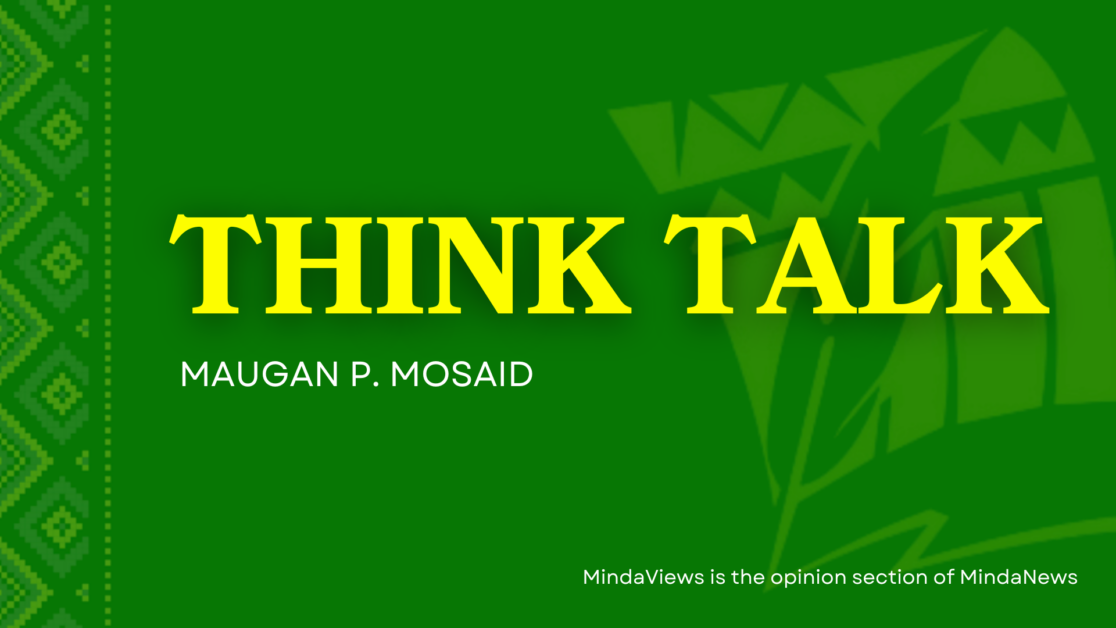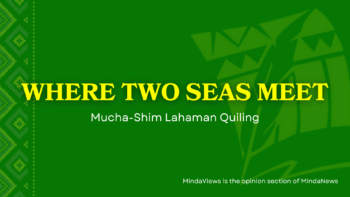
MATALAM, North Cotabato (MindaNews / 22 October) – China has told the U.S. many times to find a solution to the Israel-Palestine conflict. The U.S., finally, is trying to find a solution save that it is quite too late. After the Israeli-Hamas war erupted anew, and as always in the past, the U.S. always stood with Israel. And now, the U.S. wants China to use its influence over Iran to stop supporting the Palestinian people. We hope Russia would tell the US to stop supporting Israel.
But why the U.S. is not finding a mutual solution to end the conflict? At least, it is now clear that the U.S. does not even want to end the conflict. Just the way the U.S. is doing in Ukraine to prolong the war, it is obviously trying to do the same thing here. This will cause great loss of human lives. And what China is trying to do now is quite interesting to find out.
Is China ready to shake hands with the U.S. just to end the Israeli-Palestinian conflict? Why does the U.S. suddenly turn to China when it can very well do things on its own in this conflict? Will the U.S. benefit in a deadly war like this? Several questions more keep lurking in our minds.
As expected, powerful countries would always try to find solutions to armed conflict and maintain peace in important places. Many countries look up to the U.S. as a peacekeeper. But sometimes this falls short. Rather, it appears that the U.S. is not very keen in playing that role. Oftentimes, she supports conflict that causes problems to other nations.
On the other hand, China seems more interested in ending the conflict. The United States used to be a country that people looked up to in terms of providing solutions to conflicts and maintaining world peace. However, in recent times the US has been seen as a little disinterested in playing the role of peace-keeper. This has led to a situation where many countries no longer pay attention to what the US has to say. Currently, there is an urgent need to resolve the conflict between Israel and Hamas.
The US is trying to convince China to use its influence, especially over Muslim countries, to help prevent this war from escalating into a regional conflict. It is interesting because, now, the Middle East countries are paying more attention to China rather than the US.
The recent meeting between a congressional delegation from the US and President Xi Jin Ping emphasized the importance of diplomatic channels and the need to diffuse tensions in the middle east. US Senate majority leader Charles Schumer and his colleagues in both the Republican and Democratic parties engaged the Chinese leadership emphasizing the significance of Chinese role in influencing Iran. Their objective was to prevent the war from spreading into a wider theater of fire.
The Hamas-Israeli conflict has long been a source of tension and conflict in the Middle East. It revolves around the Israeli-Hamas dispute with Hamas, as a Palestinian militant group, controlling the Gaza strip that Hamas has been using as a staging ground in launching attacks against Israel. The United States, along with the European Union, has designated Hamas as a terrorist group.
The recent escalation of the conflict has raised concerns that Iran, a nation with known history of supporting the militant groups Hamas and Hezbollah, may be openly involved.
The Wall Street Journal reported that Iranian security officials helped in planning the attacks against Israel at a meeting in Beirut. However, it is important to note that this report was not corroborated by other possible sources as some US officials are quite cautious in affirming the accuracy of this report.
Diplomacy remains a key tool in preventing conflicts from escalating and promoting peace. The diplomatic approach of the US Senate delegation to China represents a crucial approach to de-escalating the situation. Their primary objective was to persuade China, a nation with significant influence over Iran, to use its diplomatic clout in the region. The US Senators knew that China’s influence over Iran extends across broader avenues making it a potential force in maintaining peace in the region.
But why is the US so eager to end the Israeli-Hamas issue and slow or even hesitant to find a solution to the Russian-Ukrainian conflict? Of course, the sooner the issue is resolved the better it is for both parties and stakeholders.
In a conflict, before taking a stand with one side you look for a solution. Before the war started China already offered a solution to possibly end the conflict between Israel and Palestine. China talked about how Israel has controlled Palestine and how the west has been involved in all these. The US just kept quiet. But as soon as the war started the US woke up from sleep and said: “this conflict should end”. Where was the US before the war started?
Apparently, the US has a different solution in mind. She was toying with the idea that the only way to stop the war is to see Hamas defeated. This is why the US sent, almost instantly, her dreaded 7th Fleet into the Mediterranean, not as a buffer for peace-keeping, but as a standby power to quell any third force that may enter the picture.
How could the powerful countries have allowed this conflict to turn into a shooting war through their silence and inaction? And now the US is making some overtures to stop the conflict from spreading but only after so many innocent civilians, women and children were killed. The US condemns Hamas for Israelis killed but does not do the same over Israel’s ongoing human carnage in Gaza.
Many say that there are still some US interests that would compel her to find a solution. However, it is quite obvious that the US is not working enough on its own to find a solution to end this conflict. Instead, the US supported Israel’s declaration of war. Now, it is just pressing China to make Iran pressure the Hamas to stop fighting. Preventing only the enemy of your ally is not a solution at all. The solution is to listen to both parties and make them agree to one thing; a win-win solution so-to-speak.
China’s response to the US Senators’ request is notable. Mao Ne, a spokesman for the Chinese foreign ministry repeated that China’s commitment is focused on preventing further loss of civilian lives. She expressed China’s opposition to actions that would tend to escalate the conflict and destablize the region. China’s stand is clear. They hoped for an end to the fighting and swift return of peace.
The diplomatic push by the US in China carries several potential implications. The engagement between the US and China in bringing about peace and stability in the region highlights the evolving dynamics of global power. It demonstrates the recognition that no single nation can address conflicts and geo-political issues alone. In this issue, the US needs China. The US engagement with China demonstrates China’s growing influence in global affairs.
The situation in the Middle East necessitates a multilateral approach as initiated by the superpowers. In a negotiation the US and China could act as facilitators for possible talks between Palestine and Israel.
Peace in the Middle East, and elsewhere, is possible only if the US does not play the dangerous game of double standards: one for its allies and another for the enemies of her allies.
(MindaViews is the opinion section of MindaNews. Maugan P. Mosaid holds a doctorate degree in rural development. He is a planning consultant and teaches Statistics and Methods of Research in the graduate school. He can be contacted at mauganmosaid6@gmail.com).







